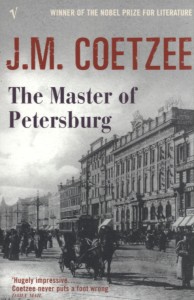 I once told J. M. Coetzee about a novel I wanted to write, based on the exciting and edifying life of the Marquise de la Tour du Pin. He looked rather doubtful, and then gave me some very good advice: “Don’t stay too close to the truth.” This seems to be advice he has both followed and not followed in The Master of Petersburg, which takes as its subject the life and times of Fyodor Dostoevsky. What a complicated, rich, and moving novel this is! Certainly, Coetzee knows Dostoevsky’s era. He has read all the letters and biographies, as well as Dostoevsky’s work in depth. Many details from Dostoevsky life are important to the plot: his father’s probable murder by his serfs, his epilepsy, his years in Siberia, his gambling and money problems, his struggles to maintain his faith, his generosity, his reactionary beliefs. Even the voice seems close to Dostoevsky’s at times. And readers familiar with Crime and Punishment and The Possessed will recognize many echoes.
I once told J. M. Coetzee about a novel I wanted to write, based on the exciting and edifying life of the Marquise de la Tour du Pin. He looked rather doubtful, and then gave me some very good advice: “Don’t stay too close to the truth.” This seems to be advice he has both followed and not followed in The Master of Petersburg, which takes as its subject the life and times of Fyodor Dostoevsky. What a complicated, rich, and moving novel this is! Certainly, Coetzee knows Dostoevsky’s era. He has read all the letters and biographies, as well as Dostoevsky’s work in depth. Many details from Dostoevsky life are important to the plot: his father’s probable murder by his serfs, his epilepsy, his years in Siberia, his gambling and money problems, his struggles to maintain his faith, his generosity, his reactionary beliefs. Even the voice seems close to Dostoevsky’s at times. And readers familiar with Crime and Punishment and The Possessed will recognize many echoes.
Where the text diverges from the historical fact is in its treatment of death and grief. One wonders if Coetzee’s main purpose here in writing about Dostoevsky was to establish a necessary distance, a camouflage, allowing him to deal with material too hot to hold, material that needs this middle distance in order to be rendered on the page—that is, the death of his own son in 1989, a few years before The Master of Petersburg was published. The mediating presence is Dostoevsky’s stepson Pavel Isaev, whose fate in the pages of this novel seems remarkably similar to that of Coetzee’s son, who fell from a balcony to his death. This is a novel about the loss of a son, about deep ineradicable love and hate, about the rivalry felt between a father and a son, about rebellion and guilt, about the mythic and the real. Coetzee has played around with the historical facts with considerable freedom. He has used them for his own purposes, as a disguise for his own expression of extreme grief.
The book is also, perhaps most importantly, about writing and the necessary gall (the last word used in the book) involved in the recording of our lives. The writer must be willing to write about anything—nothing, not even the death of a child, can be sacred. The great writer must be willing to make the pact with the devil, to sell his soul. The searing honesty of the book, the courage, and its unflinchingly direct look at human nature in all its bestiality, while recording the sinister truths of our souls, are its great virtues. Those of us acquainted with the underworld of loss, suicide, or murder will find ourselves in these pages. What amazes me with each rereading of Master of Petersburg is how willing Coetzee is to sell his soul, so that we, the readers, may feel we are not the only sinners in the world.

